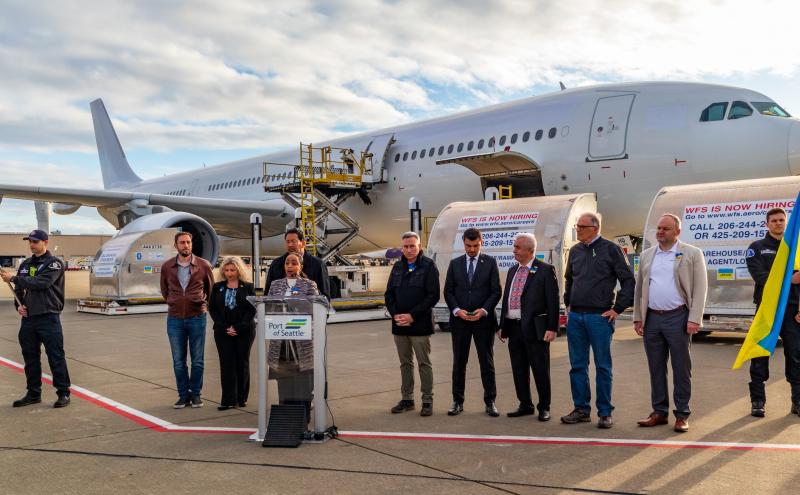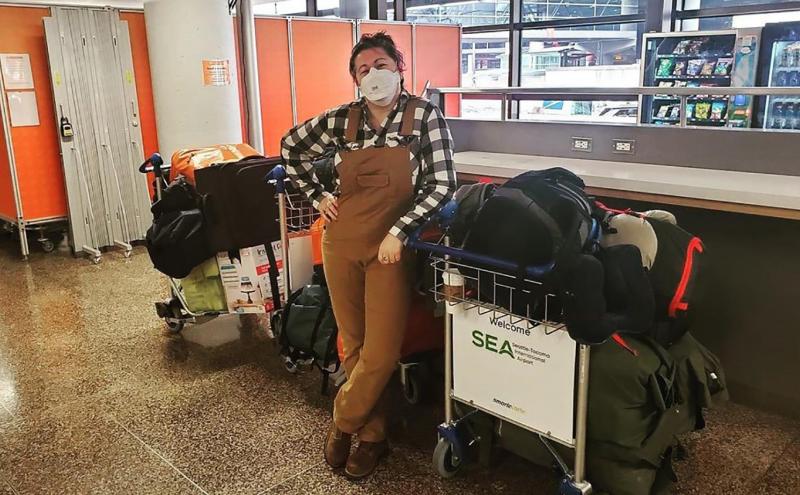
Flying can be stressful for anyone. For those fleeing their country in search of safety, or those venturing into the unknown to lend support, removing extra barriers or complications is especially critical. So when Ukrainian refugees were separated from a critical piece of luggage and Ukraine aid workers needed to transport essential supplies, Seattle-Tacoma International Airport (SEA) jumped in to help. Here's the story of how the airport helped ensure that precious cargo made its way into the right hands.
Help and relief
When Andee Vaughan and Christopher Sheppard arrived at Seattle-Tacoma International Airport (SEA) this spring towing 13 bags crammed with 600 pounds of emergency supplies for their relief trip to Ukraine, they weren’t sure how it was all going to come together.
“The relief trip aligned with my reasons for being a nurse, like harm reduction, community health philosophy, and trauma-informed care,” Vaughan said.
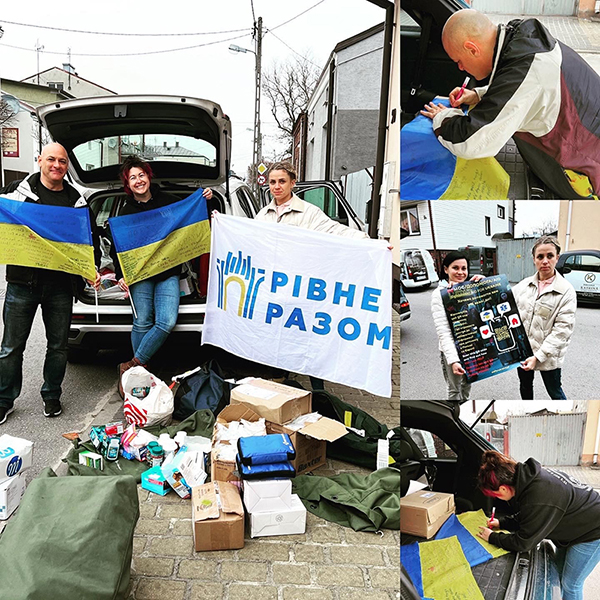
Vaughan planned to take unpaid leave from work for the trip, and she and Sheppard raised enough money to fund the trip and buy supplies. With help from friends in the medical field, they put together around $15,000 of medical supplies, medications, antibiotics, blood pressure medication, over the counter medications, infant formula, Pedialyte, underwear, socks, shirts, and clothing.
With just 48 hours notice of their trip, Vaughan and Sheppard prepared for their flight from SEA to Krakow, Poland, meeting for the first time the day before their flight.
“We get along swimmingly and are both super ok with chaos,” she said. “We both take things as they come so there is a great symbiosis with both of our backgrounds. Chris was an officer in the Marine Corps, so he is used to deploying at last minute. We both understand that you can’t always expect certain things. You have to roll with the flow.”
SEA support
On the day of their flight, they headed to SEA. They were going with the flow, with no clear plan on how to get the bags through the airport or whether they would be responsible for potentially thousands of dollars in bag fees.
But a friend of Vaughan’s who works in the commercial fishing industry made a call to a Port connection and set off a cascade of support across the Port and SEA Airport. Help was on the way before Vaughan and Sheppard even reached the airport.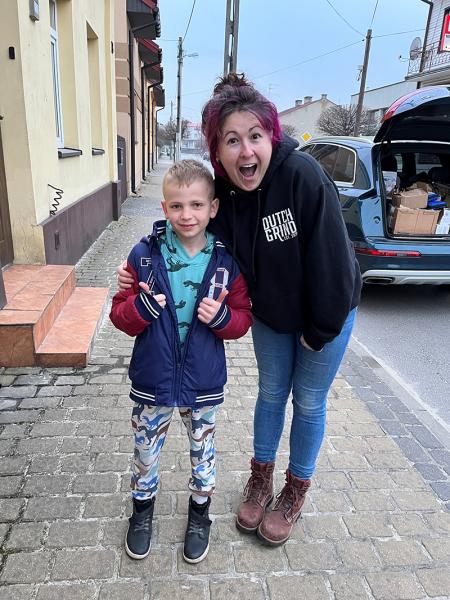
Port staff reached out to Delta’s check in counter manager to see if bag fees could be waived. Port staff met Vaughan and Sheppard at their arrival to help them transport three carts packed with luggage to Delta’s check in counter.
“Once we got to the airport it was as smooth as silk. We were not stressed at all,” Vaughan said. “It felt like the red carpet had been rolled out for us. We were completely taken care of. I was so scared that our bags weren’t going to be able to go over so I had a backup plan. If Delta couldn’t take all of our bags, I packed two bags with hospital grade medical equipment and told myself that I would pay for those two bags to be checked in.”
Delta Airlines staff waived bag fees. Bags were then checked, counted, and weighed. The Port also gave Vaughan and Sheppard supplies like pens, pencils, swag, earplugs, and notebooks to distribute to refugees.
After landing in Krakow, Vaughan and Sheppard packed their rental car with the emergency supplies and delivered them to refugee distribution centers across Poland as they headed toward the Ukrainian border.
“We stuffed that rental car to the brim,” Vaughan said. “I was sitting with two suitcases on my lap and in between my legs. We started taking contents out to stuff in the cracks and crannies of the car.”
Through their work with the NGO, they also distributed information and hung fliers and posters pointing to resources.
During the rest of the trip Vaughan and Sheppard paired up with several small NGOs. They helped relocate numerous families to countries like Sweden and Germany and paid for heating elements, tents at the border, more medical supplies, and even vehicles. They are continuing to raise funds and have since made return trips to Ukraine to provide additional medical aid and other types of assistance, and have started working on building a nonprofit in Seattle with the help of several people they collaborated with in Poland, called American Aid.
Safe and sound
In 1994 Svetlana O’Brien and her two daughters, ages six and seven, came to the United States as refugees from Ukraine after the collapse of the Soviet Union. She left the rest of her extended family behind in Ukraine with the hope that one day they would all be reunited.
Since then, Svetlana, who now works in Human Resources at the Port of Seattle, has returned to Ukraine twice over the years to visit family but keeps in touch primarily through social media.
In September 2021, Svetlana's cousin Iryna was diagnosed with lung cancer. She underwent chemotherapy and had lung surgery in February 2022 to remove half of her lung and a lymph node. Iryna was recovering from surgery in a hospital 25 miles from the Russian border when Russia invaded Ukraine. Russians started bombing the hospital at 4:00 a.m. and Iryna and other patients were moved to the basement for safety. Three days later the hospital was destroyed. Because of her lack of mobility, she could not leave and remained in the hospital basement for three months to stay safe.
Seeking safety
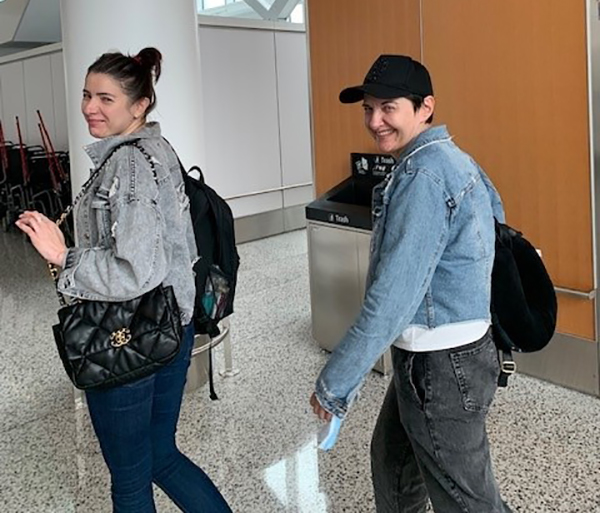 When President Biden announced the United States would take 100,000 Ukrainian refugees, Svetlana feared for her family's safety. So she started planning to bring her eight family members living in the Ukraine to the United States. Through a GoFundMe campaign, she raised enough money to pay for airplane tickets to bring her family to the United States.
When President Biden announced the United States would take 100,000 Ukrainian refugees, Svetlana feared for her family's safety. So she started planning to bring her eight family members living in the Ukraine to the United States. Through a GoFundMe campaign, she raised enough money to pay for airplane tickets to bring her family to the United States.
Svetlana’s cousin Iryna and niece Maryna were the first to come to the United States under the program. On June 6, 2022, they touched down in Seattle.
“I was so grateful,” Svetlana said. “The Port of Seattle Aviation Executive Team allowed me to meet my family at the international arrivals gate. They don’t speak English, had never been on a plane, and were just getting off a 12-hour flight, so it meant a lot that I was able to be there.”
After the family reunited, they waited for their luggage, but Iryna’s bags never arrived. The luggage contained Iryna's medical records including MRI results, chemotherapy records, and surgery records that she had recovered before she left the hospital. The paperwork was an essential guide for doctors at Seattle Cancer Care Alliance on how to begin treatment.
Lost luggage
After two weeks of calls to the airline with no information, Svetlana and her family were giving up hope. As a last resort, Svetlana reached out to the Voice of Immigrants Committed to Equity (VOICE) Employee Resource Group at the Port of Seattle to see if any members might have any connections that could help locate the luggage. A VOICE member contacted a high-level executive at the airline, and within hours, the missing bag was found in Frankfurt, Germany. It was scheduled to arrive at SEA the next day, but before Svetlana could connect with the luggage in Seattle, it went missing again.
Maggie Foss, Baggage Operations System Specialist in the Port’s Aviation Maintenance Department, jumped in to help. After investigating, she located the bag and retrieved it herself later that evening. Foss personally delivered the bag to the family’s home to get it there safely.
“I cannot even express the amount of gratitude and appreciation for [Maggie’s] help,” Svetlana said. “I am so grateful to Maggie and the team for all their help. We are sitting here crying, as we are so happy her luggage has been found. We are so so thankful to you for locating it and bringing it to us. Please know that my cousin says that you are just a miracle sent her way. Thank you all so much!”
With her medical records successful delivered, Iryna has scheduled an appointment with an oncologist to begin chemotherapy following her surgery earlier this year.

